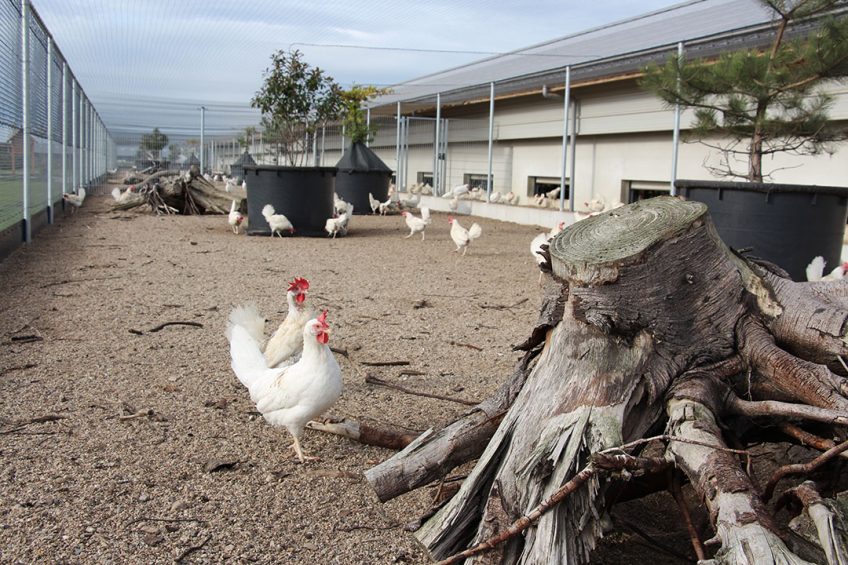Leftovers as main feed ingredient

In the Kipster poultry-housing concept, sustainability is key. Ruud Zanders, the concept’s founder, was declared the second most sustainable person in the ‘Duurzame 100’, a Dutch sustainability top 100. The company also won the Rabobank Sustainable Innovation Award and the Mansholt Business Award for sustainable entrepreneurship this year.
His parents grew up just after World War II in a large, poor farmer family. They never threw out leftovers, but fed them to the pig. Once fattened, the pig was slaughtered and eaten. In hindsight, this was circular agriculture in its purest form. Being an entrepreneur at Kipster, Ruud Zanders (45) is certainly not afraid to say what he thinks about that. “When sustainability is important for you, you do not serve turkey for Christmas. In circular agriculture, you convert residual flows into animal protein as efficiently as possible. A hen that lays an egg does exactly that. Fattening animals for their meat is far less efficient.”
Mr Zanders follows the principles that stem from circular agriculture research conducted by WUR professor Imke de Boer and Dr Hanna van Zanten. Ruud Zanders: “According to these principles, you use good and fertile soil for human vegetable consumption. Marginal or poor soil that can only sustain grass should be used for dairy cows or goats. Goats belong to the more woody crops of Southern Europe and North Africa. Residuals flows from the land and from human consumption are fed to animals that convert them as efficiently as possible into animal proteins. This way, it will become clear that you use dairy cows, laying hens and pigs optimally in the food system.”
 Ruud Zanders (45), the founder of the Kipster poultry-housing concept, sees the role of the animal changing in food production, leftovers from human consumption can be used for feed for different spiecies. Ruud Zanders (45), the founder of the Kipster poultry-housing concept, sees the role of the animal changing in food production, leftovers from human consumption can be used for feed for different spiecies. |
Other role for animals
Generally speaking, Mr Zanders thinks that the role of the animal in food production should change. “I always ask people how ethical it is to feed good raw materials that are very suitable for human consumption to animals bred for that purpose, knowing that almost 1 billion people on earth are starving. In other words, we have 1 kilogram of grain that can feed ten people, but we give it to a pig or broiler and to 2 to 4 people. This is very inefficient and does not only ask for a new way of producing, but also of consuming.”
In addition to the conscious prevention of food competition, Kipster also connects town and country, according to Mr Zanders. Literally, because two entrepreneurs that have Kipster shares live in Amsterdam and are true city dwellers. One is sustainability expert Maurits Groen. Mr Groen has published, among other books, the Dutch version of Al Gore’s book about the dangers of the greenhouse effect. The other urban dweller is communications strategist Olivier Wegloop. Mr Zanders: “They have a completely different angle than we have. People from the city often have an opinion about food that matters more than the sector wants to believe or recognise.”
Feeding only residual flows
Mr Zanders used to have an international poultry company with poultry houses in several countries around the world. As a result of avian flu, among other things, the company went bankrupt in 2007. “Luckily, my wife and I managed to stay away from debt restructuring. When something like this happens, you start thinking about life in general. I decided to do things completely differently. It was clear to me that I wanted to stay in the poultry sector.”
He became CEO of the Rondeel and lectured on the Healthy Poultry Industry at Aeres College in the Dutch city of Dronten. He started developing the Kipster concept together with his partners in 2013. After years of masterminding and preparing the concept, they started the construction of the modern Kipster house for 24,000 chickens in Oirlo in 2017. The farm is privately funded.
Kipster is more catholic than the pope with regard to the principles of circular agriculture. Mr Zanders: “Secretary Schouten (the Dutch Secretary for agriculture) says that we can also use regionally grown grains, if we practise circular agriculture. We say, using only residual flows is better. In other words, we need to prevent human-animal food competition. Good, fertile soil should not be used for the food production for pigs, laying hens or broilers. You should feed these animals with existing residual flows and use dairy cows to graze on marginal soil. That way, you use all available farm land as efficiently as possible for feeding humans.”
‘Plant based is the future’
Mr Zanders eats almost completely plant based by now. His wife and children initially thought: ‘sure, whatever’. By now, they have started to embrace his way of thinking. “The global community cannot be completely fed with vegetables, because that would mean we have to stop using our marginal soil and residuals flows and we would not produce enough food for the entire global population,” he laughs. “I do take the current level of technique into account. Because we can consume far less meat with this way of thinking, I see meat substitutes as a good development.”
Kipster laying hens are fed with left over rusk, knäckebröd, rice cakes, rejected ice-cream waffles and eggshells from bakeries. These are leftovers, which means the chickens are not organic. Mr Zanders: “The organic sector grows (organic) grains and corn to feed laying hens. It is better to give them residual flows, to keep the grain and corn for human consumption. Furthermore, I think it is a complete waste of land that so many hectares are used for organic laying hens, while the animals often do not even use their free range. Those hectares could be used for human food production.”
Kipster talks to everyone, even the most extreme animal welfare and environmental organisations. “If we engage with these organisations, we are not interested in what they minimally want, but what the maximally want right now.”
Construction of a second farm
By now, Kipster has applied for the environmental license in the district where it wants to build a second farm. This will be a copy of the current farm in Oirlo. Kipster hopes to start construction in March of this year. The reason to build a second farm is that the demand for Kipster eggs, only sold by the supermarket Lidl, is permanently larger than supply.












